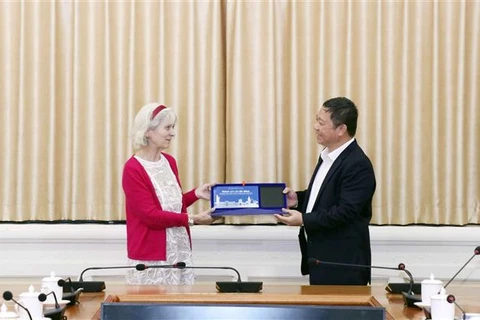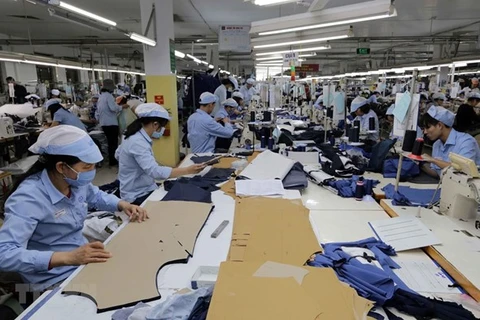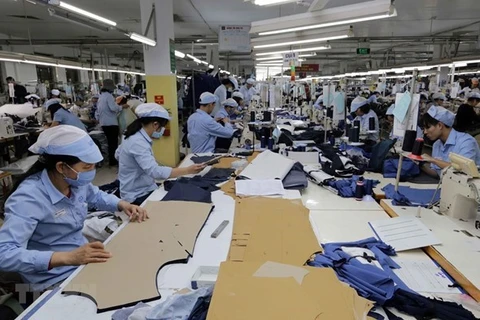Hanoi (VNS/VNA) - The Vietnam Chamber of Commerce and Industry (VCCI) and the International Labour Organisation (ILO) organised the forum “Decent work and the future of Vietnam’s Electronics Supply Chains” in Hanoi on July 15, involving Government agencies and industry partners.
As Vietnam is moving forward after the COVID-19 pandemic was controlled, the country has a unique opportunity to create more and better jobs, better places to work and to increase productivity and skills in its electronics supply chain.
Vietnam has recorded a continuous year-on-year increase in electronics export values, which now account for one-third of the total national export values. As one of the biggest electronics exporters in the world, Vietnam’s export values in 2021 climbed up to more than 108 billion USD. The electronics sector employs more than 1 million workers.
However, the industry mainly focuses on low-value-added and labour-intensive outsourcing and assembly activities.
“Among the biggest challenges faced by enterprises are major upheavals in human resources, including labour shortage. How to attract workers to return to work, how to create decent work for them is now a difficult question,” VCCI Vice Chairman Hoang Quang Phong addressed the forum.
Preliminary results of the latest enterprise survey conducted by VCCI with ILO support show that around 60 per cent of respondents found a shortage of skilled workers as a moderate to severe challenge in the electronics sector. Half of the enterprises also named the technical skills of supervisors and managers as another major issue.
In that context, ensuring resilient, inclusive and sustainable enterprises in the manufacturing sectors, including the electronics industry, is a top priority to maintain growth and remain competitive globally.
“This includes attention to decent work to be able to sustain the industry’s competitiveness in the global market and contribute to the country’s socio-economic development,” said ILO Vietnam Director Ingrid Christensen.
This is in line with the ILO Global Call to Action for a Human-centred Recovery, which focuses on four interrelated pillars – inclusive growth and employment, protection of workers, universal social protection and social dialogue.
“The country may sustain the growth of the industry with proper investment in decent work conditions including the facilitation of social dialogue and participation in programmes promoting workplace compliance,” Christensen added.
Electronics businesses have developed a channel of mutual support to effectively practise social dialogue at all levels to increase productivity and create better working conditions. This practice is expected to spread to other key export sectors nationwide.
“Social dialogue will play a key role in ensuring sustainable supply chains,” said Head of the EU Delegation to Vietnam Ambassador Giorgio Aliberti.
“Promoting decent work is key to reaching an inclusive, sustainable and resilient electronics industry in Vietnam."
He also emphasised that the requirements of investors, consumers and legislators around the world to promote decent work in global supply chains are on the rise.
Through several projects funded by the EU and other donors, the ILO, in close collaboration with VCCI, supports partners to address work deficits and improve global supply chains in the industry./.
As Vietnam is moving forward after the COVID-19 pandemic was controlled, the country has a unique opportunity to create more and better jobs, better places to work and to increase productivity and skills in its electronics supply chain.
Vietnam has recorded a continuous year-on-year increase in electronics export values, which now account for one-third of the total national export values. As one of the biggest electronics exporters in the world, Vietnam’s export values in 2021 climbed up to more than 108 billion USD. The electronics sector employs more than 1 million workers.
However, the industry mainly focuses on low-value-added and labour-intensive outsourcing and assembly activities.
“Among the biggest challenges faced by enterprises are major upheavals in human resources, including labour shortage. How to attract workers to return to work, how to create decent work for them is now a difficult question,” VCCI Vice Chairman Hoang Quang Phong addressed the forum.
Preliminary results of the latest enterprise survey conducted by VCCI with ILO support show that around 60 per cent of respondents found a shortage of skilled workers as a moderate to severe challenge in the electronics sector. Half of the enterprises also named the technical skills of supervisors and managers as another major issue.
In that context, ensuring resilient, inclusive and sustainable enterprises in the manufacturing sectors, including the electronics industry, is a top priority to maintain growth and remain competitive globally.
“This includes attention to decent work to be able to sustain the industry’s competitiveness in the global market and contribute to the country’s socio-economic development,” said ILO Vietnam Director Ingrid Christensen.
This is in line with the ILO Global Call to Action for a Human-centred Recovery, which focuses on four interrelated pillars – inclusive growth and employment, protection of workers, universal social protection and social dialogue.
“The country may sustain the growth of the industry with proper investment in decent work conditions including the facilitation of social dialogue and participation in programmes promoting workplace compliance,” Christensen added.
Electronics businesses have developed a channel of mutual support to effectively practise social dialogue at all levels to increase productivity and create better working conditions. This practice is expected to spread to other key export sectors nationwide.
“Social dialogue will play a key role in ensuring sustainable supply chains,” said Head of the EU Delegation to Vietnam Ambassador Giorgio Aliberti.
“Promoting decent work is key to reaching an inclusive, sustainable and resilient electronics industry in Vietnam."
He also emphasised that the requirements of investors, consumers and legislators around the world to promote decent work in global supply chains are on the rise.
Through several projects funded by the EU and other donors, the ILO, in close collaboration with VCCI, supports partners to address work deficits and improve global supply chains in the industry./.
VNA























